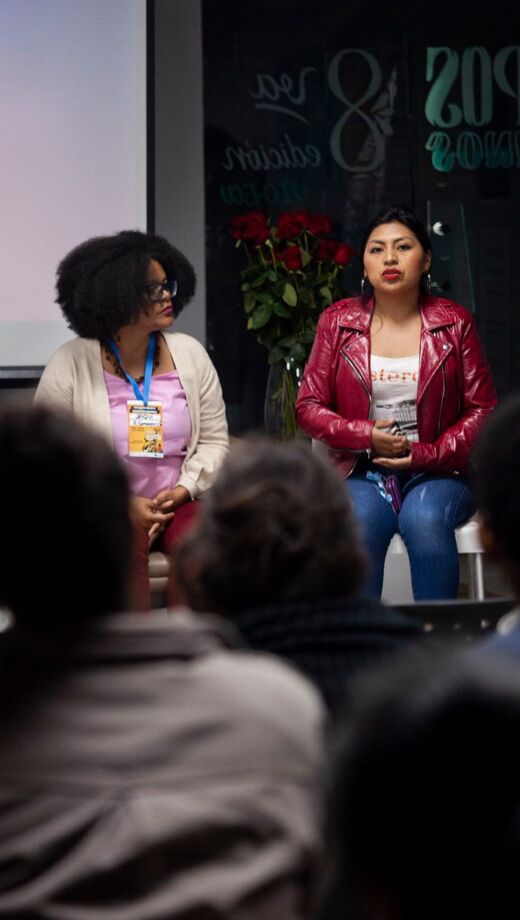
Supported Projects 2021
To promote the screenings of human rights cinema worldwide, Movies that Matter offers grants to human rights film events in Africa, Asia, Latin America, the Middle East and Eastern Europe, especially in countries with limited resources and freedom of press. These events can take various forms, such as human rights film festivals, LGBTI film festivals and mobile cinema projects.
Selection Committee
In 2021 the selection committee of the Movies that Matter Grant Programme consisted of
- Yoon-Shik Boxman, festival director of CinemAsia
- Leon Willems, director of Free Press Unlimited
- Will Janssen, head of business development at Hivos
- Raúl Niño Zambrano, head of film programmes Sheffield DocFest
- Margje de Koning, artistic director of Movies that Matter
Supported Projects 2021
-
25 November 2021 – 25 August 2022
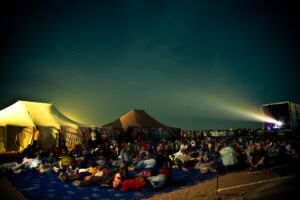 Mobile cinema project run by the Abidin Kaid Saleh film school in the Sahrawi refugee camps. Most films that will be screened have a focus on the Western Sahara. Next to year-round film screenings in schools, libraries, women’s cooperatives and youth centres, other activities include community filmmaking workshops, ‘Mini FiSahara’ screenings for kids, and roundtables with community members.
Mobile cinema project run by the Abidin Kaid Saleh film school in the Sahrawi refugee camps. Most films that will be screened have a focus on the Western Sahara. Next to year-round film screenings in schools, libraries, women’s cooperatives and youth centres, other activities include community filmmaking workshops, ‘Mini FiSahara’ screenings for kids, and roundtables with community members.This edition will host events in new venues for new audiences, including primary and secondary schools in five refugee camps. The project aims to transform feelings of hopelessness and abandonment that have taken a hold of youth and children into constructive energy. The project is estimated to attract a total number of 9000 visitors.
-
September – October 2021
The Peace for Tomorrow Film Festival presents a series of four weekends with screenings in four different cities in China on the topic of migration and refugees. The screenings are organised in cooperation with local film clubs and aim to target an audience that can support refugee communities, journalists, activists and students. After each screening there will be a debate about the topic of the film with directors, scholars on the field, and international practitioners. The Peace for Tomorrow Film Festival is estimated to attract a total number of 1600 visitors.
-
10 August – 18 December 2021

The 2nd edition of the My Movie is to be in Peace festival aims to combine online, broadcast and offline screenings. The offline screenings will take place in four peripheral communities and three former guerrilla camps (AETCRs). The three AETCRs Los Monos (Cauca), Filipinas (Arauca) and Pondores (Guajira) will receive a Cinema Box for Peace, each as a tool for watching and discussing films on a monthly basis. The films that have been selected mainly revolve around land and power. There will be possibilities for debates and conversations both online, with the broadcast and offline. The My Movie is to be in Peace festival is aiming for a total number of 10500 visitors.
-
11 – 22 November 2021
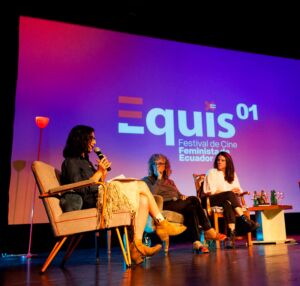
The 3rd edition of EQUIS took place from 11 – 22 November 2021. At EQUIS special attention is given to women in vulnerable situations and women without internet access. This edition aimed to showcase other ways of thinking about the world as well as highlighting the systemic problems of our societies. It also emphasized the positive actions that women and girls take in everyday life. The feminist film festival offered a wide range of activities: open air and cinema screenings in Quito, virtual screenings, a drive-in cinema, Q&A’s, a stop-motion and autobiographical documentary workshop for migrant women; and a round table on female Ecuadorian film-makers. The festival was received by the audience as a great success!
-
25 November – 1 December

Jakarta’s annual 100% Manusia Film Festival presented its 5th edition from November 25 until December 1, 2021 in an online format. The film festival prioritizes screening films with human rights stories and issues of diversity, encompassing gender and HIV/AIDS. This year’s festival theme was ‘Journey’ and films, non-film events and discussions highlighted the journey of human rights implementation in various aspects. From the victims to the activist, and even more the stories of underdogs who inspire the public through their efforts of making a better life and put humanity upfront. As the festival would like to be accessible to all layers of society, all film screenings and fringe events were free of charge. In total, the festival was attended by 8677 online visitors this year, which marked a 25% increase from last year’s number.
-
June 2022
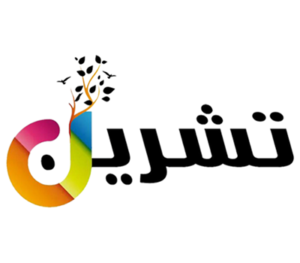 The second edition of the Triangle Human Rights Film Festival in Israel, organised by the Tishreen Association, focuses on human rights issues related to Palestinians living in Israel. The festival programme consisted of eight feature films and three shorts in Tishreen’s Alternative Space and in high schools with the participation of school’s parliaments. Following the screenings, discussions with local activists, directors and filmmakers took place. The festival aimed to serve as a platform for new connections with organisations and stakeholders in and outside the region. The festival attracted a total number of 800 visitors.
The second edition of the Triangle Human Rights Film Festival in Israel, organised by the Tishreen Association, focuses on human rights issues related to Palestinians living in Israel. The festival programme consisted of eight feature films and three shorts in Tishreen’s Alternative Space and in high schools with the participation of school’s parliaments. Following the screenings, discussions with local activists, directors and filmmakers took place. The festival aimed to serve as a platform for new connections with organisations and stakeholders in and outside the region. The festival attracted a total number of 800 visitors. -
15 December 2021 – 15 January 2022
 The first edition of this Malian human rights film festival will take place in refugee camps in Bamako, and in public spaces in the cities of Mopti and Timbuktu. It will screen the works of fifteen filmmakers from Mali and neighbouring countries – all of them are under 40, and 50 per cent are women.
The first edition of this Malian human rights film festival will take place in refugee camps in Bamako, and in public spaces in the cities of Mopti and Timbuktu. It will screen the works of fifteen filmmakers from Mali and neighbouring countries – all of them are under 40, and 50 per cent are women.Following the screenings of the films, which all are about or related to human rights, debates will take place with mayors, village chiefs, artists and human rights organisations. The main goal is to enable communities to discuss the topics that are relevant to them from different angles and perspectives. The festival is estimated to attract a total number of 5000 visitors.
-
November – December 2021

Ecologies of Cinema, a new project by Ambulante, focused on climate change and the need for Mexicans to relate to this issue. The project consisted of travelling film programmes, supported by online post-screening discussions at open air screenings in five Mexican states, from 3 November – 4 December 2021. The project created awareness with new audiences and highlighted indigenous activists. All screenings were free and open to the public. The screenings reached a total number of 1236 visitors while the main festival in Mexico City attracted almost 15.000 visitors. The Climate Story Lab had been a success: important connections were made between filmmakers, activists, investigators, international and local NGOs and funders.
-
10 – 23 December, 2021
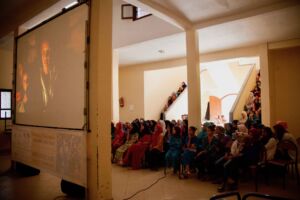 Triq Cinima (The Road of Cinema) took place in April and June 2022. This film event in Morocco is a travelling series of film screenings in almost 30 different towns and municipalities in the Souss-Massa region. Most of the screenings were followed by a Q&A with the director and/or the protagonist(s) of the film. The film event attracted a large female audience and invited many female film directors and protagonists. In total, the film event reached more than 5500 visitors.
Triq Cinima (The Road of Cinema) took place in April and June 2022. This film event in Morocco is a travelling series of film screenings in almost 30 different towns and municipalities in the Souss-Massa region. Most of the screenings were followed by a Q&A with the director and/or the protagonist(s) of the film. The film event attracted a large female audience and invited many female film directors and protagonists. In total, the film event reached more than 5500 visitors. -
September – December 2021

The 6th edition of Aks International Minorities Festival, Film – Art – Dialogue took place from 11th -27th Dec 2021 in Lahore, Karachi, Multan and Rawalpindi(Islamabad) in Pakistan. In the wake of previous year’s success and the ongoing pandemic situation, the festival also organized Aks OutReach Programme 35 screenings of LGBTIQ+ short films made in Pakistan with a focus on creating visibility of queer and trans identity. This was organised in 9 major cities of Pakistan from September 2021 until March 2022. The main festival held 20 screenings of 45 films. Almost all the screenings were followed by dialogue sessions and discussion. The festival hosted ca. 3000 attendees, several local and international guests including local politicians, artists, film festival organizers, journalists and film industry.
-
October 2021
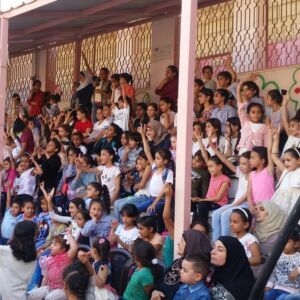
In October 2021, the Area C mobile cinema will be driving through Area C of the Jordan Valley and Jerusalem for ten days. Film screenings are organised each day in a different area, followed by a Q&A session with a relevant film-maker or human rights expert on the issues addressed in the film. Area C Mobile Cinema intends to stimulate and offer a solid platform of arts and culture in Area C, using the power of film to fight racism, injustice, and war. The Area C Mobile Cinema is estimated to reach around 7.000 visitors.
-
12 – 17 April 2022
 The sixth edition of the Red Carpet Human Rights Film Festival focused on human rights during the COVID-19 pandemic. It also gave an opportunity to Palestinian young filmmakers to present their films, stories and vision to an national and international audience. The festival screened 43 films at the main location in Gaza and other cities around Palestine. Eight discussion sessions were organised on topics such as the occupation and siege on Gaza, women’s rights and illegal death sentences in Gaza. This edition also aimed to revive the cultural sector in Palestine, and called for restoring the cinema halls in Gaza Strip, which have been closed since 1987. This is why the organisation has worked together with the municipality to reopen an old theatre as the first cinema hall in Gaza City. The festival attracted a total of 6000 visitors.
The sixth edition of the Red Carpet Human Rights Film Festival focused on human rights during the COVID-19 pandemic. It also gave an opportunity to Palestinian young filmmakers to present their films, stories and vision to an national and international audience. The festival screened 43 films at the main location in Gaza and other cities around Palestine. Eight discussion sessions were organised on topics such as the occupation and siege on Gaza, women’s rights and illegal death sentences in Gaza. This edition also aimed to revive the cultural sector in Palestine, and called for restoring the cinema halls in Gaza Strip, which have been closed since 1987. This is why the organisation has worked together with the municipality to reopen an old theatre as the first cinema hall in Gaza City. The festival attracted a total of 6000 visitors. -
25 – 30 January, 2022
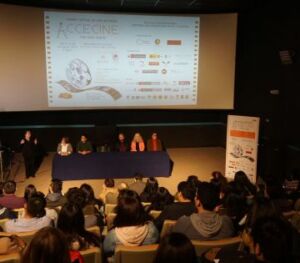 AcceCine is a free festival to promote and defend the human rights of people with disabilities in Peru. During its last edition, the festival has screened more than 25 films with audio description and closed caption subtitles. There were also debates and conversations organised on cinema, inclusion and human rights. Due to the COVID-19 pandemic, most of the activities took place online. Physical performances were held in Cusco and Piru. The festival premiered four Peruvian films in accessible versions and in total they reached almost 100.000 people with their online films and activities.
AcceCine is a free festival to promote and defend the human rights of people with disabilities in Peru. During its last edition, the festival has screened more than 25 films with audio description and closed caption subtitles. There were also debates and conversations organised on cinema, inclusion and human rights. Due to the COVID-19 pandemic, most of the activities took place online. Physical performances were held in Cusco and Piru. The festival premiered four Peruvian films in accessible versions and in total they reached almost 100.000 people with their online films and activities. -
18 – 26 September 2021
The Active Vista International Human Rights Festival serves as an important platform to implement a narrative change approach to social change in the context of the current human rights situation in the Philippines. The festival aims to engage new advocates and audiences and explore innovative paths for people to take part in the support, protection, and promotion of human rights and democracy. In September 2021, Active Vista plans to organise a hybrid type of festival – utilising both online and offline spaces (if the Covid-19 pandemic allows) to engage the Filipino public in the human rights cause. The festival is estimated to attract a total number of 10.500 visitors.
-
10 January – 4 February 2022
 The first edition of the Kultura Film Festival in the Philippines took place in the North Luzon region, in partnership with cultural and art organisations. The film festival was a hybrid festival – both online and offline. It served as a platform for open discussions on culture through the lenses of human dignity and human rights. The films have shown narratives of different marginalized cultures and indigenous communities in the Philippines and Southeast Asia. Aside from film screenings, the festival facilitated film talkbacks, human rights forums, workshops and cultural celebrations. The festival attracted more than 12.000 people.
The first edition of the Kultura Film Festival in the Philippines took place in the North Luzon region, in partnership with cultural and art organisations. The film festival was a hybrid festival – both online and offline. It served as a platform for open discussions on culture through the lenses of human dignity and human rights. The films have shown narratives of different marginalized cultures and indigenous communities in the Philippines and Southeast Asia. Aside from film screenings, the festival facilitated film talkbacks, human rights forums, workshops and cultural celebrations. The festival attracted more than 12.000 people. -
11 – 24 November 2021

In November 2021, the 14th edition of the LGBTQ+ focused festival Side by Side took place in Saint Petersburg. Due to the COVID-19 situation, the complete festival took place online. During 15 days, 33 LGBTIQ+ films were screened and 12 interactive events (discussions and Q&As) were organized covering themes such as Russian Queer Filmmaking, Queerness and Disability, Body Positive, Art Activism Queer Comics, Intersex, Queerness and Media and Emigration. With the 2021 online edition, the Side by Side LGBT International Film Festival reached 2112 visitors, which is almost a 20% rise on 2020.
-
September 2022
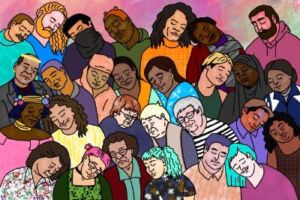 Second edition of this online feminist film festival in Ukraine addressing human rights from an intersectional perspective. The festival will screen twenty films (features and shorts) online for at least ten days, with follow-up discussions for each. The programme focuses on military conflicts, labour rights and grassroots collective filmmaking. The festival will provide subtitles, audio descriptions and sign language interpretations during the discussions.
Second edition of this online feminist film festival in Ukraine addressing human rights from an intersectional perspective. The festival will screen twenty films (features and shorts) online for at least ten days, with follow-up discussions for each. The programme focuses on military conflicts, labour rights and grassroots collective filmmaking. The festival will provide subtitles, audio descriptions and sign language interpretations during the discussions. -
2 – 12 December 2021
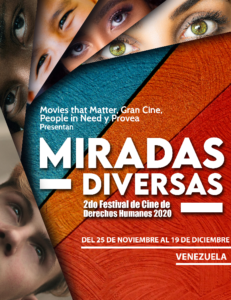
The 3rd edition of the Miradas Diversas Human Rights Film Festival in Venezuela doubled its scope by expanding from six to twelve cities. In cooperation with many different local organisations and professionals, producer Gran Cine Circuit presented both online and offline screenings, a film forum, talks, workshops, and discussions promoting the defense of human rights. This year the festival introduced three competitions as well: Fiction Feature Film, Documentary Feature Film, and the “David Suarez” Short Film Award. With this competitive turn, Miradas Diversas aspires to become an international reference for producers and filmmakers with films that gain impact. The festival was a great success with a total of 2300 mostly local people attending the festival from 2 – 12 December 2021.
-
9 – 22 March 2022
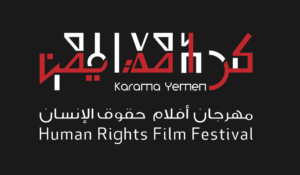 The third edition of the Karama Yemen Human Rights Film Festival. The theme ‘Reclaiming Narratives’, aimed to encourage talents and voices to express themselves, away from stereotypes and misunderstandings. Special attention was paid to minorities rights, showing stories and experiences that are often silenced or neglected. Twenty-two short films by international and Yemeni directors were screened online as well as offline in the cities Taiz, Aden and Hadramout. In total the festival attracted 3500 visitors.
The third edition of the Karama Yemen Human Rights Film Festival. The theme ‘Reclaiming Narratives’, aimed to encourage talents and voices to express themselves, away from stereotypes and misunderstandings. Special attention was paid to minorities rights, showing stories and experiences that are often silenced or neglected. Twenty-two short films by international and Yemeni directors were screened online as well as offline in the cities Taiz, Aden and Hadramout. In total the festival attracted 3500 visitors. -
Newsletter
Do you want to stay up to date with all Movies that Matter news, promotions and special screenings? Sign up for our newsletter.
Subscribe to our Industry newsletter or Educational newsletter (in Dutch) here